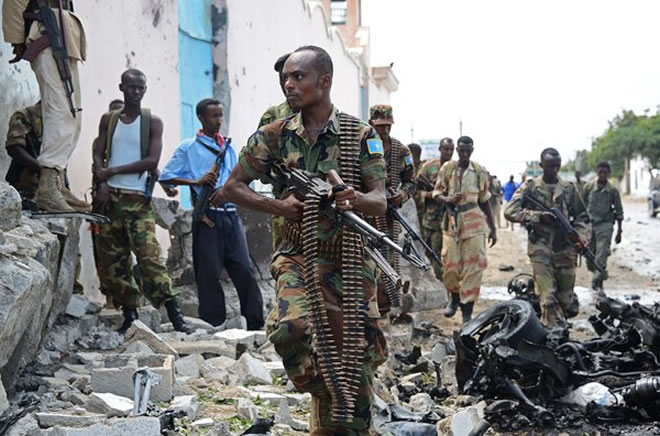
Somali government soldiers on Wednesday after insurgents attacked a United Nations compound in Mogadishu - Mohamed Abdiwahab/Agence France-Presse — Getty Images
by Abukar Arman
Wednesday, June 19, 2013
The gruesome attack on the U.N. compound in Mogadishu that killed 18 people has shocked the world. Once the “Breaking News” hit the social media, condemnations, condolences, and blame started pouring.
This latest bloody attack couldn’t come at a worst time — when security in Mogadishu was rapidly improving, when the country (especially Mogadishu) was being showcased as an emerging market, and when the newly appointed U.N. Secretary General’s Special Representative for Somalia, Ambassador Nicholas Kay, UNSOM and other U.N. agencies were getting situated in the city.
Al-Shabaab’s objective is clear: Seize the vacuum created by the prevalent false sense of security and total preoccupation with internal political bickering. (Remember, al-Shabaab was not defeated on the battleground, they just tactically immersed into the society.) Expose the government’s incapacity to provide sustainable security even in Mogadishu. Break the security gains momentum in the capital, and severely disrupt the sense of normalcy with such high profile operation. Hit the heart of the U.N. operation and its private security groups to pressure it to reconsider total transfer of its operations into Mogadishu.
What should we learn from this? I hope the following two things:
First, as I tweeted earlier, it’s time to seriously invest in rebuilding the national army. Anyone who is interested to know how serious the international community has been in adequately training, arming, and paying the Somali Army (and members of the other branches of the security apparatus) should compare the peanuts invested in Somalia verses Iraq and Afghanistan.
Second, as the government (and AMISOM forces) increases its military push against al-Shabaab, it must keep in mind that winning a guerilla war carried out inside a city like Mogadishu with over two million residents is almost impossible. If such warfare was in any way easy the mightiest military force on the face of the earth (U.S./NATO) would’ve defeated the Taliban long ago; hence, the importance of exploring other strategic non-military options in dealing with al-Shabaab.
Third, the U.N. should not be intimidated by this attack. Any retreat would further embolden al-Shabaab. It was encouraging to hear Ambassador Kay say: “the U.N. is committed to its mission…We’re here to help and we’re here to stay.”
Abukar Arman is a former diplomat (Somalia's Special Envoy to the US). Arman is widely published political analyst. His focus has been post-civil war Somalia, extremism, Islam, and US foreign policy. He is a DiploAct of a sort (fusion of diplomacy & activism). You may follow him on Twitter: @AbukarArman and reach him via e-mail: [email protected]